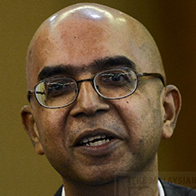Mainly because I often wear Bersih t-shirts, and partly because I am a known Bersih collaborator, I am often asked what will come after the Bersih 4 rally. Here's my response.
 First, everyone should recognise that the Bersih 4 rally in Kuala Lumpur will go down in history as the rally with the largest turnout, ever, in Malaysia. Over half a million people were on the streets of Kuala Lumpur over 34 hours. Thanks to the photos and Google mapping technology used to calculate the turnout, the claim of half a million is not vacuous.
First, everyone should recognise that the Bersih 4 rally in Kuala Lumpur will go down in history as the rally with the largest turnout, ever, in Malaysia. Over half a million people were on the streets of Kuala Lumpur over 34 hours. Thanks to the photos and Google mapping technology used to calculate the turnout, the claim of half a million is not vacuous.
Second, everyone should recognise Bersih 4 received mammoth funding from Malaysians. In the build-up to Bersih 4, over 27,000 individuals contributed RM2.6 million to Bersih 2.0, the organisers of Bersih 4. No Malaysian NGO has ever attracted such massive funding in one month. Yet, no one was paid to participate in Bersih 4.
Third, everyone should recognise that though Bersih 4 was centred in Kuala Lumpur, it was a national and even international event: thousands also showed up in Kuching and Kota Kinabalu, and in 90 cities around the world.
Fourth, everyone should recognise "everyone" includes all elected representatives, including members of the government. It is up to you and I to put these questions to every elected representative: "What is your evaluation of Bersih 4? Why?", "What is your personal response to Bersih 4?", "What is the government's response to Bersih 4?"
Fifth, everyone should recognise the failure of government-allied, government-funded forces to paint the Bersih 4 rally as a "Chinese" event. The fact is, none of the Bersih 4 rally organisers called to Bukit Aman for investigation were Chinese, except for Maria Chin Abdullah. The fact is, the majority of security personnel who kept order at Bersih 4 were Bumiputera. The fact is, the majority of speeches at Bersih 4 were in Bahasa Malaysia.
Sixth, everyone should recognise the frustration felt by many present at Bersih 4, that the majority of participants were urban, not rural folks. This is not to say they were all from Kuala Lumpur or Selangor, for the answer to the question "dari mana?" was often "Perlis" or similarly distant places.
Seventh, everyone should recognise the importance of the urban/rural factor, for it showcases the deceptions of the Election Commission over the years. Thanks to the efforts of Bersih 2.0, a coalition of 87 NGOs, everyone now knows how the government stays in office despite massive scandals. It stays in office by appointing Election Commissioners who give massive, disproportional weight to easily duped rural voters.
Eighth, everyone should recognise that Bersih 4, like its predecessors, is an indicator of the change in race relations in Malaysia. Only those who didn't attend the event in Kuala Lumpur will claim it was dominated by one race. The fact is, there were many Bumiputera, Indians and others, all united against injustice and repression in the nation.
Ninth, everyone should recognise that Bersih 4 has thrown up a massive challenge to Bersih 2.0, the coalition. Bersih 4 was more than a massive verdict of no-confidence in Prime Minister Datuk Seri Najib Razak and the Mahathirian system of government via institutional corrosion and concentration of power in the PM's office. Bersih 4 was a verdict on democracy and on the fractious opposition coalition: both are apparitions.
Tenth, everyone should recognise everyone and their pets are telling Bersih 2.0 what to do next. Bersih 2.0 has been a small, KL based organisation. In KL, Bersih 2.0 couldn't even distribute t-shirts through outlets other than their office in Petaling Jaya. Distribution elsewhere is best described as fitful.
Everyone should recognise that a Bersih 5 rally (if any), and thereafter, should and will be very different from the Bersih 4 because of the success of Bersih 4, because of the expectations of supporters and because of the changes Bersih 2.0 must undergo.
Will Bersih 2.0 become the premier vehicle for the protection and promotion of democracy in Malaysia? Will it be able to spread out of KL? Will it be able to do so without being dependent upon political parties for gathering people?
Will Bersih 2.0 become the conductor of a national orchestra of individual NGOs who act as unique instruments, rehearsing and together playing tunes of change?
Will Bersih 2.0 become the midwife for democracy in Malaysia, just like the Tunisian national dialogue quartet which was just awarded a Nobel prize?
Will Bersih 2.0 become an aimless ship tossed about on the waves of supporters' directions?
Will Bersih 2.0 find ways to collaborate with the wiser members of government, as it did with Datuk Saifuddin Abdullah before he abandoned Umno? Or will it become endemically "opposition"? Or, perish the thought, will it become fat, dumb and happy?
Change is vital. Change is a leadership challenge. Change is a slow process of experimentation and error. What's next remains to be seen. – October 29, 2015.
* This is the personal opinion of the writer or publication and does not necessarily represent the views of The Malaysian Insider.


Comments
Please refrain from nicknames or comments of a racist, sexist, personal, vulgar or derogatory nature, or you may risk being blocked from commenting in our website. We encourage commenters to use their real names as their username. As comments are moderated, they may not appear immediately or even on the same day you posted them. We also reserve the right to delete off-topic comments